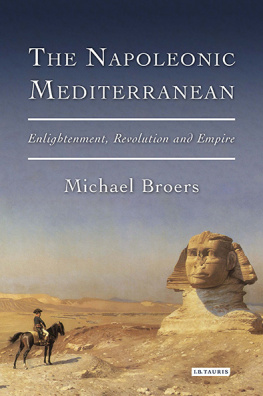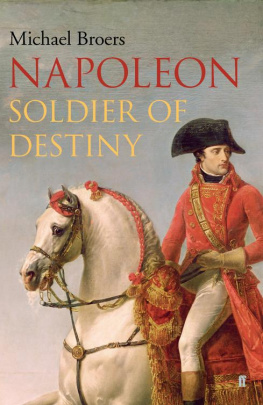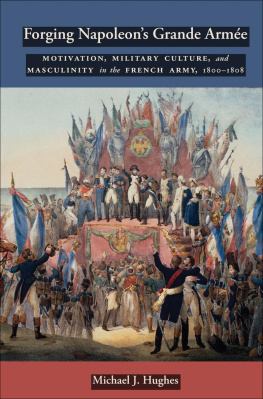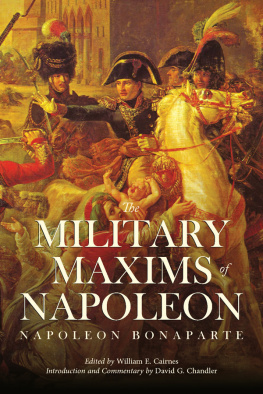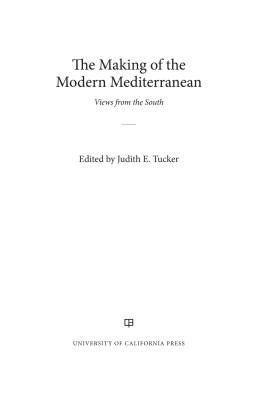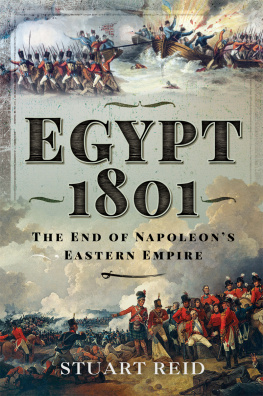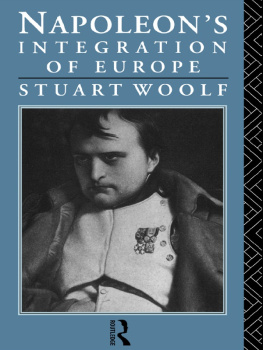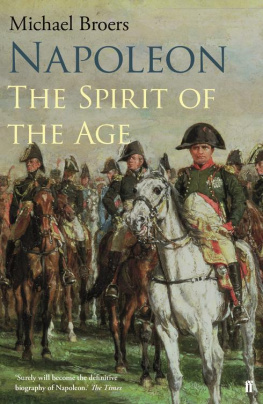Michael Broers is Professor of Western European History, University of Oxford and Fellow in Modern History, Lady Margaret Hall, Oxford. His books include The Napoleonic Empire in Italy, 1796 1814; The Politics of Religion in Napoleonic Italy; Napoleon: Soldier of Destiny; Europe Under Napoleon (I.B.Tauris) and Europe after Napoleon: From the Congress of Vienna to the 1848 Revolutions (I.B.Tauris, forthcoming).
Praise for Napoleon: Soldier of Destiny
Surely will become the definitive life of Napoleon
The Times
This is a masterly biography, both critical and empathetic
Christopher Silvester, Financial Times
Stimulating and genuinely innovative
William Doyle, Times Literary Supplement
Judicious and magisterial... Broers grasp of violently changing times is unimpeachable
Daily Mail
Brings home brilliantly the vitality, intelligence and phenomenal drive of this man, and the improbability of his achievements... The wait for volume two is going to be unbearable
Mail on Sunday
Breathtaking. The best and certainly the most original scholar writing in this field... Broers succeeds admirably.
New York Review of Books
THE NAPOLEONIC
MEDITERRANEAN
Enlightenment, Revolution and Empire
M ICHAEL B ROERS
To the remarkable people of
the Cardiology Units of the Nuffield Manor and
John Radcliffe Hospitals, Oxford,
who shall always be an inspiration to me.
Published in 2017 by
I.B.Tauris & Co. Ltd
London New York
www.ibtauris.com
Copyright 2017 Michael Broers
The right of Michael Broers to be identified as the author of this work has been asserted by the author in accordance with the Copyright, Designs and Patents Act 1988.
All rights reserved. Except for brief quotations in a review, this book, or any part thereof, may not be reproduced, stored in or introduced into a retrieval system, or transmitted, in any form or by any means, electronic, mechanical, photocopying, recording or otherwise, without the prior written permission of the publisher.
References to websites were correct at the time of writing.
International Library of Historical Studies 102
ISBN: 978 1 78453 144 7
eISBN: 978 1 78672 087 0
ePDF: 978 1 78673 087 9
A full CIP record for this book is available from the British Library
A full CIP record is available from the Library of Congress
Library of Congress Catalog Card Number: available
PREFACE
The chapters if this book stretch over many years, and have incurred countless debts to friends and colleagues, archivists and librarians, across France, Italy, Spain and the UK. Many were researched and written with the generosity of granting bodies. The four central chapters of this volume were made possible by the combined help of the awards of Major Leverhulme Trust Fellowship (201113) and a British Academy Small Grant in Aid of Research (201011). I wish to thank both bodies most sincerely for their faith in my abilities; these chapters are, hopefully, the first fruits of further research, and I can only hope they are worthy of such confidence in my work. I also wish to thank the Principal and Fellows of Lady Margaret Hall, and the Faculty of History of the University of Oxford, for their support of the latter stages of the central chapters of this volume, and for the leave they accorded me during the Major Leverhulme award.
Some of these chapters have been previously published in scholarly journals and I extend my thanks to the editors and publishers of those publications for their permission to republish. The details are as follows: The Parochial Revolution: 1799 and the Counter-Revolution in Italy, Renaissance and Modern Studies, 33 (1989) pp. 159173; The Myth and Reality of Italian Regionalism:
A Historical Geography of Napoleonic Italy, 180114, The American Historical Review, 108, 3 (2003) pp. 688709; Ferdinando Dal Pozzo: A Piedmontese Notable at the Heart of Napoleonic Europe, 180014, Annali di storia moderna e contemporanea, 1 (2013), pp.227264; Cultural Imperialism in a European Context?: Political Culture and Cultural Politics in Napoleonic Italy, Past & Present, 170 (2001) pp. 152180; Noble Romans and Regenerated Citizens: The Morality of Conscription in Napoleonic Italy, 180014, War in History, 8 (2001) pp. 251270.
The contents of this book span many years, but the earliest were written when I first met Sue, my wife of 26 years. They span our life together, and this book is for her. Who else?
INTRODUCTION
DELINEATING AN IMPERIAL REGION
The impact of Fernand Braudel: Structure and agency in history
Imperialism in a Mediterranean context
A t first glance, there can seem no more incongruous pairing than that of Fernand Braudel, the greatest exponent of la longue dure, and a historian of the Napoleonic episode. It may well prove that the first glance is, indeed, correct, but as I attempted to search for a red thread in this collection of chapters and, indeed, for a source of continuous influence in all my work, Braudel recurred, over and again. His first volume of The Mediterranean and the Mediterranean World in the Age of Philip II That balance always lies somewhere between two extremes, but almost never at the meridian, and there is much to suggest that, in this geographical and historical context, the scales tip in favour of Braudel and structural forces.
The French revolutionaries and the Napoleonic imperialists promoted rupture, because they encountered continuity. For all the ideological sound and fury of the French Revolution, just as for all the ambitious state-building of the Napoleonic regimes, the world they sought to master was still an early modern one. Technology was not yet so advanced as to move mountains or sweep over seas with the speed of steam that would change the world a generation later. The new regime still had to spread enlightenment on horseback or on mule-back if it really wanted to reach much of the region and by sail and wind. Thus, the mountains still came first, and the sea was still the surest highway, if beset by wind and tide. There is no escaping these basic truths, and Braudel is the historian best equipped to remind us of them.
My debt to Braudel reaches much further than these essentials, however. Braudel's coupling of history and geography remains fundamental to me, but his influence begins there, rather than ends. Perhaps unwittingly, Braudel is an excellent guide to the problems of imperial rule. He searches out and pinpoints wide patterns across the Mediterranean, less in the quest for linkage than in discerning similarities born of comparable local circumstances. In this way, he provides an illuminating context for the experiences of imperial administrators, servants of a regime bent on uniformity, confronted by incongruity, but whose responses to the particular regions they administered proved remarkably similar, when set beside each other. The societies, political cultures and economies of far-flung imperial possessions had, after all, considerable affinities. On the one hand, such similarities were in the eyes of beholders who shared a rigid, imperial vision, but a reading of Braudel reveals that such regions did, indeed, have many fundamental things in common, born of topography, climate, and the influence of both on society, the economy, and the nature of the state. The eye of the imperial servants may have been jaundiced by a sense of cultural superiority, but their common responses to living in the widespread provinces of the empire were not based, entirely, on prejudice. They stemmed from the enduring patterns within the atomised regions of the Mediterranean macro-region, which Braudel discerned with such skill. They met similar circumstances in areas which were distant from each other, and they responded to them, in like fashion.

